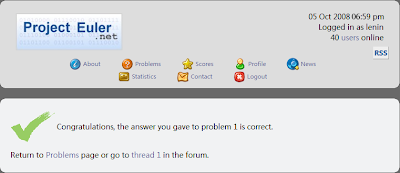“欧拉工程”是一个很有意思的网站,它每周会提供一道数学题,要求访问者使用任一种编程语言设计一个计算机程序求解。到现在为止已经出了二百一十一道题,当然,题的难度是依次递增的。几十个国家的程序员已参与了这个工程,截至目前,中国有四百多人参与,但是解决所有的二百多道题的只有一个人。
我觉得没事儿的时候做一道很有意思,下面是第一道,很简单:
If we list all the natural numbers below 10 that are multiples of 3 or 5, we get 3, 5, 6 and 9. The sum of these multiples is 23. Find the sum of all the multiples of 3 or 5 below 1000.
最容易想到的一算法就是依次取出一到一千的整数,只要是三或五的倍数,就累加起来,最终的和就是结果:
```python sum = 0 for num in range(1,1000): if not (num % 3 != 0 and num % 5 != 0): sum += num print sum ```但是我觉得这个算法太普通了,从一到一千要做一千次循环,时间复杂度会比较高。所以我设想只取出三和五的倍数,然后相加就行了,所需要考虑的只是怎么处理三和五的公倍数的问题。下面是我的算法,只有三百多次循环:
```python def SumMultiple(feed,limit): threeMultiple = 3 * feed fiveMultiple = 5 * feed if threeMultiple >= limit: return None if fiveMultiple >= limit: return threeMultiple if fiveMultiple % 3 == 0: return threeMultiple return threeMultiple + fiveMultiple sum = 0 for feed in range(1,500): if SumMultiple(feed,1000) == None: break; sum += SumMultiple(feed,1000) print sum ```不过事与愿违,通过测试,这个算法的效率要比上一种低,我想应该是SumMultiple()函数中运算和比较次数较多导致的。
不管怎样,第一个问题已经顺利解决了:

